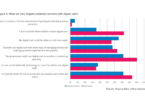Most central banks exploring central bank digital currency (CBDC) use banks as intermediaries. While Russia is doing the same for the digital ruble, the Bank of Russia plans to launch a direct support line for end users.
Last week, the central bank published a request for proposals, with many of the details only available after signing a nondisclosure agreement, according to Kommersant. It stated that it wants “to assess the cost of performing work to create a multi-channel digital complex for recording telephone conversations, organizing the reception of calls, recording them, using and storing records as part of the launch of the first line of customer support for the Bank Russia.”
The reference to ‘multi-channel’ means it will also include online support.
We previously noted that the central bank has not put privacy at the forefront of its CBDC promotions. While it says the CBDC is voluntary, some fear that pensions might be paid out using the digital ruble. However, that should only be a problem if people can’t transfer those rubles to a bank.
Some jurisdictions, such as the UK and Europe, are going out of their way to alleviate Big Brother fears that the central bank can see private payment details. With the Bank of Russia providing first-line technical support, it does precisely the opposite. How can you have a support query without giving the central bank your details?
The reference to ‘first line support’ means they will likely pass on detailed queries to the relevant bank.
The rationale for central bank CBDC support
There are several potential reasons for the central bank being the first access point.
It creates an image of a single system rather than a bank-centric system. With the central bank providing some support, it also takes some of the cost away from the commercial banks. High costs have been a concern raised by banks involved in CBDC projects worldwide.
Direct user calls will enable the central bank to get unfiltered feedback about concerns users may have about the concept.
Finally, it gives the central bank feedback about which banking apps work well and which are challenging consumers. Doubtless, the central bank will create metrics to monitor end-user satisfaction, such as support calls divided by user numbers for a particular bank.
A more controversial view is that this marks the first step towards the central bank usurping commercial banks. A Russian legislator recently envisaged the role of banks fading as blockchain payment systems become more widespread.
Meanwhile, the Bank of Russia started its digital ruble pilot six months ago with 13 banks. We recently highlighted that the first phase does not include Sber, Russia’s largest state-controlled bank. However, it will be involved in the second phase.






